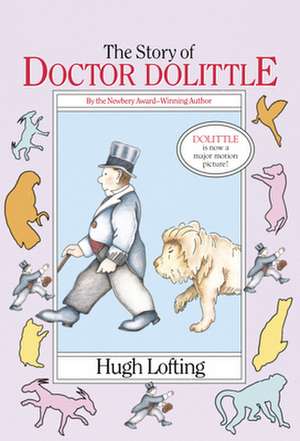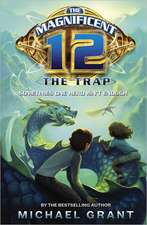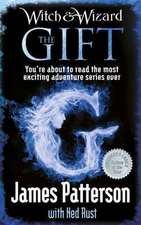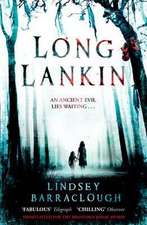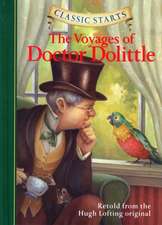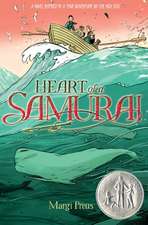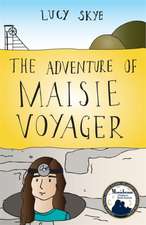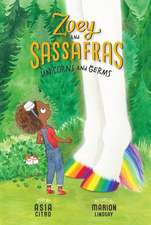The Story of Doctor Dolittle
Autor Hugh Loftingen Limba Engleză Paperback – 30 noi 1968 – vârsta de la 8 până la 12 ani
| Toate formatele și edițiile | Preț | Express |
|---|---|---|
| Paperback (19) | 27.81 lei 3-5 săpt. | |
| Dover Publications – 31 dec 2004 | 27.81 lei 3-5 săpt. | |
| Mint Editions – 28 feb 2021 | 32.73 lei 3-5 săpt. | |
| Penguin Random House Children's UK – 31 oct 2001 | 36.91 lei 24-35 zile | +12.88 lei 4-10 zile |
| Vintage Publishing – 3 oct 2013 | 41.66 lei 24-35 zile | +13.86 lei 4-10 zile |
| Penguin Random House Children's UK – 5 sep 2018 | 41.87 lei 24-35 zile | +14.17 lei 4-10 zile |
| CreateSpace Independent Publishing Platform – | 43.56 lei 3-5 săpt. | |
| Pan Macmillan – 25 dec 2019 | 44.47 lei 3-5 săpt. | +6.42 lei 4-10 zile |
| CreateSpace Independent Publishing Platform – | 46.00 lei 3-5 săpt. | |
| Prakash Books – 7 ian 2020 | 54.17 lei 17-23 zile | +4.69 lei 4-10 zile |
| CREATESPACE – | 67.36 lei 3-5 săpt. | |
| Alpha Editions – 29 dec 2018 | 111.41 lei 3-5 săpt. | |
| CREATESPACE – | 49.73 lei 6-8 săpt. | |
| Digireads.com – 24 aug 2019 | 51.80 lei 6-8 săpt. | |
| CreateSpace Independent Publishing Platform – | 67.36 lei 6-8 săpt. | |
| 1st World Publishing – 22 iul 2013 | 72.15 lei 6-8 săpt. | |
| – | 72.19 lei 6-8 săpt. | |
| – | 76.69 lei 6-8 săpt. | |
| Book Jungle – 27 iul 2008 | 83.73 lei 6-8 săpt. | |
| LIGHTNING SOURCE INC – 16 mai 2018 | 108.17 lei 17-23 zile | |
| Hardback (2) | 111.96 lei 6-8 săpt. | |
| Positronic Publishing – 12 dec 2019 | 111.96 lei 6-8 săpt. | |
| 1st World Publishing – 22 iul 2013 | 171.98 lei 6-8 săpt. |
Preț: 43.27 lei
Nou
Puncte Express: 65
Preț estimativ în valută:
8.28€ • 8.55$ • 6.89£
8.28€ • 8.55$ • 6.89£
Carte indisponibilă temporar
Doresc să fiu notificat când acest titlu va fi disponibil:
Se trimite...
Preluare comenzi: 021 569.72.76
Specificații
ISBN-13: 9780440483076
ISBN-10: 0440483077
Pagini: 176
Dimensiuni: 135 x 191 x 11 mm
Greutate: 0.12 kg
Editura: Yearling Books
ISBN-10: 0440483077
Pagini: 176
Dimensiuni: 135 x 191 x 11 mm
Greutate: 0.12 kg
Editura: Yearling Books
Extras
He was poorer than he had ever been before. But the Doctor refused to worry.
"Money is a nuisance," he said. "We'd all be much better off if it had never been invented. Who cares about money as long as we are happy?"
But soon even the animals began to worry. One night, as the Doctor snored in his chair before the kitchen fire, they whispered among themselves about what to do.
The owl, Too-Too, who was good at arithmetic, figured that there was only enough money to last one week--if they each had only one meal a day.
"I think we should do the housework ourselves," Polynesia suggested. "After all, it's because of us that the Doctor is so lonely and poor."
They agreed that Chee-Chee, the monkey, would do the cooking and mending; Jip, the dog, would sweep the floors; Dab-Dab, the duck, would dust and make the beds; Too-Too, the owl, would keep the accounts; and Gub-Gub, the pig, would do the gardening. Because she was the oldest, Polynesia, the parrot, would be housekeeper and laundress.
At first the new jobs were very hard to do--except for Chee-Chee, who had hands and could do things like a person. But soon they got used to it and thought it was great fun to watch Jip sweep his tail over the floor with a rag tied to it for a broom. They worked so well that the Doctor said his house had never been so clean before!
The animals built a vegetable and flower stall outside the garden gate. They sold radishes and roses to people going by on the road.
But there still was not enough money to pay the bills. Yet Doctor Dolittle did not worry.
"Never mind," he said. "The hens lay eggs and the cow gives milk. We can always have omelets and pudding. There are plenty of vegetables in the garden. The winter is a long way off."
But that year the snow came earlier than usual. Although the horse hauled in lots of wood from the forest for big fires in the kitchen, most of the vegetables were gone. For the first time, the animals were really hungry.
Excerpted from The Story of Doctor Dolittle by Hugh Lofting. Copyright (c) 1920 by Hugh Lofting. Copyright (c) 1940 by Josephine Lofting. Centenary edition copyright (c) 1988 by Christopher Lofting. Adaptation edition copyright (c) 1997 by Bantam Doubleday Dell Books for Young Readers. Excerpted by permission of Bantam Doubleday Dell Books for Young Readers, a division of the Bantam Doubleday Dell Publishing Group, Inc. All rights reserved. No part of this excerpt may be reproduced or reprinted without permission in writing from the publisher.
"Money is a nuisance," he said. "We'd all be much better off if it had never been invented. Who cares about money as long as we are happy?"
But soon even the animals began to worry. One night, as the Doctor snored in his chair before the kitchen fire, they whispered among themselves about what to do.
The owl, Too-Too, who was good at arithmetic, figured that there was only enough money to last one week--if they each had only one meal a day.
"I think we should do the housework ourselves," Polynesia suggested. "After all, it's because of us that the Doctor is so lonely and poor."
They agreed that Chee-Chee, the monkey, would do the cooking and mending; Jip, the dog, would sweep the floors; Dab-Dab, the duck, would dust and make the beds; Too-Too, the owl, would keep the accounts; and Gub-Gub, the pig, would do the gardening. Because she was the oldest, Polynesia, the parrot, would be housekeeper and laundress.
At first the new jobs were very hard to do--except for Chee-Chee, who had hands and could do things like a person. But soon they got used to it and thought it was great fun to watch Jip sweep his tail over the floor with a rag tied to it for a broom. They worked so well that the Doctor said his house had never been so clean before!
The animals built a vegetable and flower stall outside the garden gate. They sold radishes and roses to people going by on the road.
But there still was not enough money to pay the bills. Yet Doctor Dolittle did not worry.
"Never mind," he said. "The hens lay eggs and the cow gives milk. We can always have omelets and pudding. There are plenty of vegetables in the garden. The winter is a long way off."
But that year the snow came earlier than usual. Although the horse hauled in lots of wood from the forest for big fires in the kitchen, most of the vegetables were gone. For the first time, the animals were really hungry.
Excerpted from The Story of Doctor Dolittle by Hugh Lofting. Copyright (c) 1920 by Hugh Lofting. Copyright (c) 1940 by Josephine Lofting. Centenary edition copyright (c) 1988 by Christopher Lofting. Adaptation edition copyright (c) 1997 by Bantam Doubleday Dell Books for Young Readers. Excerpted by permission of Bantam Doubleday Dell Books for Young Readers, a division of the Bantam Doubleday Dell Publishing Group, Inc. All rights reserved. No part of this excerpt may be reproduced or reprinted without permission in writing from the publisher.
Recenzii
"Any child who is not given the opportunity to make the acquaintance of this rotund, kindly, and enthusiastic doctor/naturalist and all of his animal friends will miss out on something important."-- Jane Goodall
Descriere
Doctor Dolittle prefers his animal patients to his people patients. And one day when a mysterious call beckons him to Africa, he discovers that he can talk to animals. Now the people are talking about Doctor Dolittle.
Notă biografică
Hugh Lofting
Textul de pe ultima copertă
John Doolittle is a kind-hearted country physician who keeps goldfish in his pond, rabbits in the pantry, white mice in a piano, and a hedgehog in the cellar. He also has an unusual gift: he can talk to animals a talent that comes in handy, since he prefers treating animals, rather than humans, as his patients.
One day, a mysterious call summons him to Africa, where a serious epidemic has spread among the monkey population. Of course, the good doctor sets out immediately with some of his best friends Jip, the dog, and Polynesia, the parrot, among others. Along the way, they re joined by new acquaintances, including the pushmi-pullyu, a remarkable creature that has a head at both ends of its body.
"Any child who is not given the opportunity to make the acquaintance of this rotund, kindly, and enthusiastic doctor/naturalist and all of his animal friends will miss out on something important," said renowned primatologist Jane Goodall.
An entertaining classic that has charmed readers of all ages for generations, Hugh Lofting's timeless tale is accompanied by 27 of his own delightful illustrations.
Slightly abridged Dover (2004) republication of the edition published by J. B. Lippincott Co., Philadelphia, 1920. 27 black-and-white illustrations. xiv+78pp. 53/16 x 81/4. Paperbound.
One day, a mysterious call summons him to Africa, where a serious epidemic has spread among the monkey population. Of course, the good doctor sets out immediately with some of his best friends Jip, the dog, and Polynesia, the parrot, among others. Along the way, they re joined by new acquaintances, including the pushmi-pullyu, a remarkable creature that has a head at both ends of its body.
"Any child who is not given the opportunity to make the acquaintance of this rotund, kindly, and enthusiastic doctor/naturalist and all of his animal friends will miss out on something important," said renowned primatologist Jane Goodall.
An entertaining classic that has charmed readers of all ages for generations, Hugh Lofting's timeless tale is accompanied by 27 of his own delightful illustrations.
Slightly abridged Dover (2004) republication of the edition published by J. B. Lippincott Co., Philadelphia, 1920. 27 black-and-white illustrations. xiv+78pp. 53/16 x 81/4. Paperbound.
"
Cuprins
Chapter - 1: Puddleby Chapter - 2: Animal-Language Chapter - 3: More Money Troubles Chapter - 4: A Message from Africa Chapter - 5: The Great Journey Chapter - 6: Polynesia and the King Chapter - 7: The Bridge of Apes Chapter - 8: The Monkeys' Council Chapter - 9: The Leader of the Lions Chapter - 10: The Rarest Animal of All Chapter - 11: The Prince Chapter - 12: Medicine & Magic Chapter - 13: Red Sails and Blue Wings Chapter - 14: The Rats' Warning Chapter - 15: The Barbary Dragon Chapter - 16: Too-Too, the Listener Chapter - 17: The Ocean Gossips Chapter - 18: Smells Chapter - 19: The Rock Chapter - 20: The Fisherman's Town Chapter - 21: Home Again
